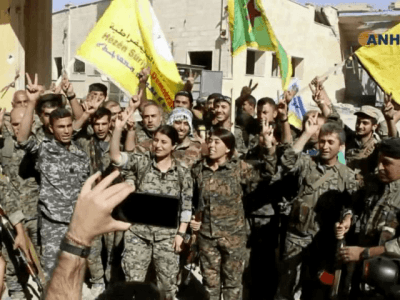
Islamic State terrorist group defeated in former ‘caliphate’ capital of Raqqa
A major milestone in the defeat of the Islamic State was reached on Tuesday, as the Kurdish-led, U.S.-backed Syrian Democratic Forces (SDF) announced that the Syrian city of Raqqa has been liberated from ISIS.
The Associated Press portrays the statement from Brig. General Talal Sillo of the SDF as a preliminary declaration of victory, with formal announcements to follow. Sillo said his forces are now in control of the former “capital of terrorism.”
The city square where ISIS militants carried out many of their gruesome executions has been taken, along with the city hospital, which terrorist forces were using as a command center. A spokesman from SDF said that 22 ISIS fighters were killed during the operation to take the hospital, which Fox News describes as “riddled with bullets and partly blackened from a fire.”
The Raqqa stadium, which the Islamic State converted into a prison, became the last holdout for the defeated militants. The AP notes it is not clear if any ISIS fighters are still holed up in the stadium. Some of the surrounding buildings are still said to contain Islamic State holdouts, and General Sillo cautioned that operations to clear away land mines and booby traps were ongoing.
Col. Ryan Dillon, a spokesman for the U.S.-led coalition against ISIS, confirmed on Tuesday that SDF forces have seized the final ISIS strongholds in Raqqa but are still working to secure them.
“We have not received official reporting to say Raqqa is cleared,” Dillon said. He went on to say that the fall of Raqqa would deny the “wellspring” of planning and support for ISIS terrorist operations around the world.
The official U.S. position as of Tuesday is that about 90 percent of Raqqa has been taken by the SDF, but some troublesome pockets of resistance remain. The SDF, on the other hand, insists that military operations are coming to an end and the Islamic State has been defeated.
The anti-ISIS People’s Protection Units released a celebratory video of a woman in Raqqa emerging from her home, tearing off her black burqa, and celebrating the fall of the Islamic State with liberating forces.
The Islamic State’s strength in Raqqa was drained before the final battle when U.S.-backed forces opened an evacuation corridor over the weekend, in an agreement brokered by local officials and tribal elders. Hundreds of jihadis decided to take advantage of the opportunity to flee, wiping out about half of ISIS’s combat strength in its final redoubts.
The retreating jihadis took about 400 civilians with them as human shields to protect themselves until they reached safer territory. U.S. commanders expressed reservations about allowing the ISIS militants to leave with hostages, but the SDF said it was better to get them out of Raqqa to minimize the collateral damage from intense urban combat.
The liberation of Raqqa is undoubtedly a milestone event, the end of the “caliphate” if not quite the end of ISIS. Islamic State mythology is heavily based upon control of certain territory, prominently including Raqqa and the Syrian town of Dabiq, which is supposed to be the scene of a final apocalyptic battle between Muslims and infidels. Dabiq was taken from ISIS by the Free Syrian Army in October 2016.
The Islamic State’s online propaganda and recruiting efforts were heavily based on the idea that it was a literal state, with territory under its control and massive revenue flowing into its treasury. In the political parlance of the Western world, it will be tough for ISIS to spin away losing Raqqa, especially in a humiliating defeat where half its fighters ran for the hills with human shields in tow.
As that retreat demonstrates, ISIS fighters do still have a few places to go. They still have strongholds in Iraq and Syria from which they can function as an insurgency. Islamic State affiliates such as Boko Haram in Africa, terrorist organizations in Egypt and Libya, and the Islamist insurgents of the Philippines remain dangerous threats.
Coincidentally, Philippine President Rodrigo Duterte declared the long-besieged city of Marawi has been “liberated from the terrorist influence” of ISIS on Tuesday, and his government announced top terrorist leaders Isnilon Hapilon and Omar Maute have been killed.
Their ability to attract recruits and “lone wolf” volunteers online may be damaged, but it hasn’t been erased.
One analyst described the new phase of the terror state’s existence to NBC News as ISIS “moving into the cloud.” Another grimly suggested that Islamic State recruiters will be able to use the enormous collateral damage inflicted on civilians during the battle for Raqqa to their advantage, by harping on the number of Muslims killed, sickened, and impoverished by U.S. coalition forces—without, of course, dwelling on the fact that they suffered because ISIS used them as human shields.
Another troubling aftershock of the caliphate’s fall will be the return of foreign fighters to their home countries, bringing ISIS ideology and bloodlust with them like a virus. Some of them will not have far to travel. CBS News quotes Iraqi writer Hisham al-Hashem’s vision of 8,000 jihadis melting “like salt in water” into the wilds of Anbar province to “wait for the right moment to launch their next insurgency or suicide attack.”
The future will probably provide them with plenty of regional fault lines to exploit, across an almost comprehensively unstable Middle East. As for Raqqa, at some point after the last pockets of ISIS die-hards have been cleaned out and the last booby traps disarmed, the previous landlord of the premises—one B. Assad of Damascus—is likely to come calling, pressing his claim on the portions of the area his forces do not already control. The Turks will be right behind him, expressing their displeasure at the notion of a Kurdish-led military alliance controlling any substantial portion of Raqqa.
Source: Breitbart





